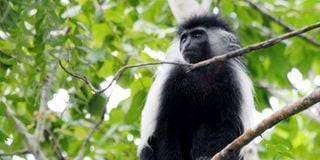Women group out to conserve colobus monkeys

A colobus monkey. The Ontulili Primate Guardians are out to restore its natural habitat in the River Ontulili ecosystem.
On a Friday morning, 58-year-old Mercy Wamuyu and other colleagues congregate on the banks of River Ontulili to embark on a fortnightly duty they have been performing religiously for the last eight months.
Armed with binoculars, a first aid kit and a data sheet, the six women will for the next two hours walk along the banks of this river on the foothills of Mt Kenya to survey and record activities of one of the endangered primates in this region — the black and white colobus monkey.
Kenya has four colobus subspecies, according to wildlife scientists, with some of them classified as endangered.
Scientists say some of the contributing factors to the declining population are habitat loss and fragmentation due to human encroachment of wildlife habitats. They are calling for multi-stakeholder involvement through community-driven initiatives.
The activities by women residing along River Ontulili ecosystem are geared towards protecting this wildlife heritage and eventually reap the benefits of wildlife conservation.
Joining Ms Wamuyu on this task of conserving this family of primates are five members of Ontulili Primate Guardians, all women determined to restore the natural habitat of this monkey. The youngest of the women group members is Irene Nyaguthii, aged 31.
This species was hunted excessively for its beautiful white-and-black fur, with its skin being used to make dance costumes, ceremonial hats and caps among many Kenyan communities, one of the factors that led to a decline in population.
“At my youthful days, there were many colobus here and it was fun watching them jump on the trees as we fetched water from this river.
"But in recent years, their population has dwindled and today only a few can be sighted occasionally, a situation I believe has been brought about by poaching or migration due to destruction of their natural habitat,” says Ms Wamuyu, a resident of Mwichuiri Two village on the boundary of Meru and Laikipia counties.
It is a situation that informed the women’s group to form Ontulili Primates Protection (OPP) with a long -term objective of investing in ecotourism.
“Currently we are involved in habitat restoration efforts through planting of indigenous and fruit trees as well as sensitising farmers on the importance of coexisting with these beautiful animals. Our future plans are to set up a camping sight where guests will view the monkeys doing their things at a fee,” says Irene Kawira, the group leader.



